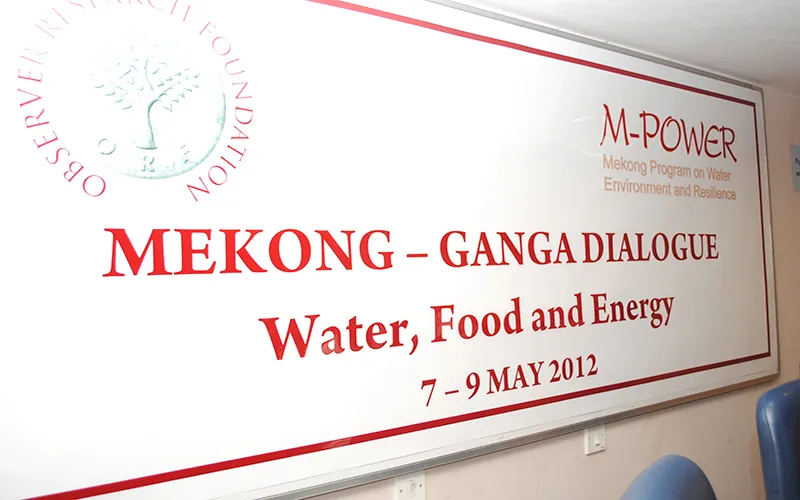A three-day Mekong-Ganga Dialogue has stressed the need for shifting thinking around river-basin development and climate change issues from narrow national security concerns to a regional perspective with ecological and social concerns.

A three-day Mekong-Ganga Dialogue, with participation from basin countries of both the rivers, has stressed the need for shifting thinking around river-basin development and climate change issues from narrow national security concerns to a regional perspective with ecological and social concerns.
The "Mekong-Ganga Dialogue: Water, Energy and Food", organised by Observer Research Foundation and M-Power, from May 7 to 9, identified de-polarizing government and civil society as the key reason to de-securitize the water dialogue and increase transparency and accountability in water governance.
The participants agreed on some next steps to take the dialogue forward. They were: 1) constituting a committee for Mekong-Ganga programme for coordinating annual dialogues, identification of lead organizations and developing a road map for cooperation in a time bound manner. 2) Creation of joint research centers to lay out the details of barriers and opportunities for cooperation in both the regions, facilitated through fellowship programs and training centers. 3) Formation of working groups for enhanced data and information sharing practices; setting up of cross-sectoral policy research agendas to improve the interface between science, practice and policy.
Mekong and Ganga river systems and the civilizations they support make environmental sustainability a critical issue in the region. The cultural links dating back thousands of years supported the bilateral relationships in the region despite ideological and political divergence. However, the seemingly convergent economic interests have broadened the scope of cooperation. While attention is often on security concerns, the congregation of non-traditional security challenges, particularly climate change, river management and environmental protection are emerging as far more critical and urgent.
As Ganga (South Asia) and Mekong (East Asia) regions pursue resource driven economic growth, resource depletion and environmental degradation are imposing huge cost on the society.
The Dialogue was organised to address this critical issue. Scholars, practitioners, policy makers and others concerned with water-related governance and its democratisation from Mekong and Ganga regions were brought together to share their experiences and to explore areas of fruitful mutual collaboration.
In the welcome address, Mr. Sunjoy Joshi, Director, Observer Research Foundation, highlighted that water, food and energy are going to circumscribe the common destiny of the world in this millennium. These among themselves would determine whether 21st century would be more prone to instability and insecurity rather than social harmony, to violence rather than peace.
Moving beyond the known, Dr. Kanokwan, Dean, Faculty of Liberal Arts, Ubon Ratchatani University, Thailand, in her keynote address, presented both great opportunities and complex challenges before modern basin management in the Mekong region as it strives to harness the basin’s vast hydropower and agricultural potential, and comes to terms with reviving its important navigational services, thus underlining the fact that water, food and energy are inseparably tied to each other.
Prof. S.R Hashim, Chairman, Indian Association of Social Science Institutions (IASSI) and a former member & Secretary, Planning Commission, in his keynote address, mentioned diverse yet significant challenges that India faces in water management, ranging from groundwater exploitation, water quantity and quality to water governance and planning. Different perceptions, bureaucracies and mis-appropriation of natural resources are detrimental to the development that India aspires to achieve, he said.
The day concluded with the identification of the fundamental questions for deliberations in the coming sessions: How is Ganga governed? What is the future of agriculture in Ganga and Mekong basins, especially with respect to small-holder farming, poverty and human development?
The second day proceedings focused on energy, groundwater mining, flood psychology, food production and policy, inter/intra-regional reportage and cooperation tracks in separate sessions in order to bring out issues more discretely. Some of the key suggestions were: one; energy efficiency is the key to energy security in both the regions; two, lateral sharing of data and information on groundwater and floods is imperative for all riparian regions; three, food security can only be achieved by encouraging sustainable productivity enhancement practices; four, there is a dire need to map the attitudes over water issues at the local, regional and national level for a more informed debate.
Based on these common aspects of concern in both the Mekong and Ganga regions, experts and other participants were involved in further exhaustive and interactive discussion mapping the similarities and differences between Ganga and Mekong regions.
The final day supplemented the previous day’s thoughts and set forth the agendas of common concerns - like the need to shift thinking around river-basin development and climate change issues from narrow national security concerns to a regional perspective and increasing transparency and accountability in water governance. And finally, the Dialogue came up with the next steps that were required to address the concerns.
Some of the key participants in the discussions were: Shri Ramaswamy Iyer, former Water Secretary, India, Amb. Salman Haider, former Indian Foreign Secretary, Joydeep Gupta, Director Third Pole Project, A.K Bajaj, former member CEA, A.K Roy, Chairperson Hazard Center, B.C Barah, former director, NCAP, Prof. Prem Vashishtha, Incharge R&D, Sharda University, Chanthana Wun’geao, Head, Faculty of Political Sciences, Chulalonkorn, Thailand, John Dore, Senior Water Resources Advisor, AusAid, Dipak Gyawali, Research Director, Pragya, Nepal, Kanokwan Monorom, Dean, Faculty of Liberal Arts, Ubon Ratchatani University, Thailand, Mme Do phan, Chair of Council, Centre for Promotion of Integrated Water Resources Management, Vietnam, Wang Jiaping, Associate prof. School of Resource & Environment and Earth Sciences, Yunnan University, China, Xu Jianchu, Senior Scientist, ICFAF, China, Zhang Jianping, Director, Department of Economic Cooperation, Institute of International Economic Research, China, Dr. Lilao Bouapao, Coordinator - M-POWER, Tira Foran, Energy Analyst, CSIRO, Clare Shakya, DFID and others.
(This report is prepared by Sonali Mittra, Research Assistant, Centre for Resources Management, Observer Research Foundation, New Delhi)
The views expressed above belong to the author(s). ORF research and analyses now available on Telegram! Click here to access our curated content — blogs, longforms and interviews.




 PREV
PREV

